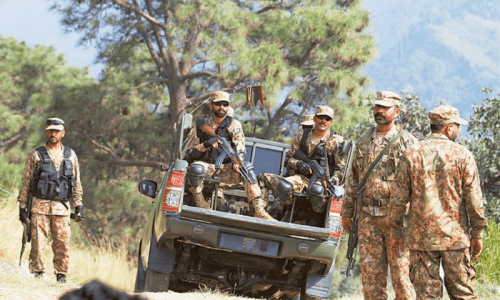
WASHINGTON: The US military's top officer bluntly accused Pakistan on Thursday of “exporting” violent extremism to Afghanistan through proxies and warned of possible US action to protect American troops.
In a scathing and unprecedented public condemnation of Pakistan, Admiral Mike Mullen said the country's main intelligence agency ISI was actively supporting Haqqani network militants blamed for an assault on the US embassy in Kabul last week.
The Haqqani network is probably the most dangerous faction in the Afghan Taliban and founded by a CIA asset turned al Qaeda ally. During the 1980s, the CIA funneled arms and cash to the Haqqanis to counter Soviet forces.
“The Haqqani Network, for one, acts as a veritable arm of Pakistan's Inter-Services Intelligence agency,” Mullen told the US Senate Armed Services Committee.
Mullen said Haqqani militants —with ISI backing —this month carried out a truck bombing on a Nato base in Afghanistan that wounded 77 Americans; assaulted the US embassy and Nato headquarters in the Afghan capital; and in June staged an attack on the InterContinental hotel in Kabul.
The admiral's tough language follows a series of stern warnings from top US officials on Pakistan's failure to crack down on the Haqqani network, raising the possibility of unilateral US action.
“If they keep killing our troops that would not be something we would just sit idly by and watch,” Mullen said of the Haqqani insurgents.
The Central Intelligence Agency already carries out drone bombing raids on al Qaeda and other militants in Pakistan's northwest tribal areas, strikes which US officials do not explicitly acknowledge.
US warnings carry particular weight in the aftermath of the American raid that killed al Qaeda chief Osama bin Laden on May 2 in Abbottabad, a unilateral operation that angered and embarrassed Pakistani leaders.
Defense Secretary Leon Panetta, appearing at the same Senate hearing, expressed frustration over Haqqani sanctuaries in Pakistan and renewed a vow that the United States would safeguard its troops.
When asked by Senator Carl Levin to elaborate, Panetta declined to say what steps the government might take —amid speculation the United States might expand drone strikes to a wider area or even stage an operation similar to the Bin Laden raid.
But he said the United States had made clear that it would do whatever is necessary to protect its troops.
“You know I haven't spelled that out for them, but I would be very surprised if they were surprised by what we did to fulfill that commitment,” he said.
Panetta said Pakistan needed to take action not only on the Haqqani network but also to cooperate on tracking down prominent extremists identified by Washington and to bolster campaign against militants inside its borders.
While Pakistan has maintained ties to some militants as a hedge to counter its arch-foe India, the gamble has proved a failure, Mullen said.
Pakistan was jeopardizing its partnership with Washington as well as its regional influence by “choosing to use violent extremism as an instrument of policy,” he said.
Mullen added: “By exporting violence, they have eroded their internal security and their position in the region. They have undermined their international credibility and threatened their economic well-being.”
In his final appearance before the Senate committee before his term ends this month as chairman of the US Joint Chiefs of Staff, Mullen defended his efforts to build a dialogue with Pakistan's military despite mixed results.
More than a dozen meetings with army chief General Ashfaq Kayani have proved crucial, he said.
“Some may argue I have wasted my time, that Pakistan is no closer to us than before—and may now have drifted even further away. I disagree,” he said.
“Indeed, I think we would be in a far tougher situation today, in the wake of the frostiness which fell over us after the bin Laden raid, were it not for the groundwork General Kayani and I had laid —were it not for the fact that we could at least have a conversation about the way ahead, however difficult that conversation might be.













































Dear visitor, the comments section is undergoing an overhaul and will return soon.